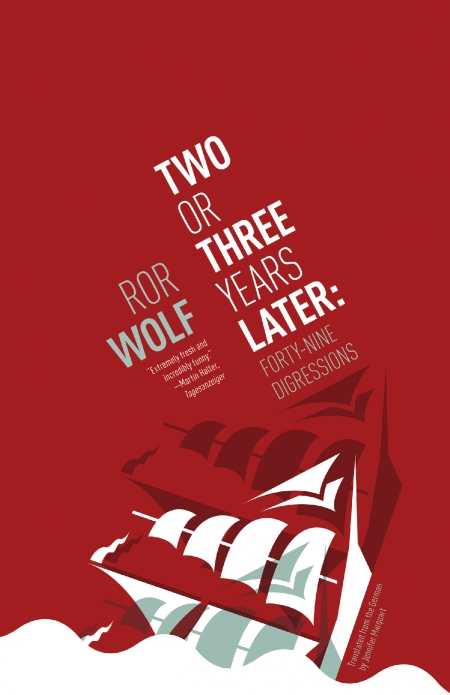Two or Three Years Later
Forty-Nine Digressions
To read this surreal series of madness, first check your sense of reality at the door.
“A man, whose name I’ve thankfully forgotten, came up to me and said something that I’ve thankfully forgotten.”
So begins “An Almost Complete Portrayal of the Conditions in Maybe Waabs”—at ninety-three words, one of the shortest of shorts in this collection. It is a story about the narrator’s “most dangerous” moment. “Thankfully,” he can remember nothing about it, but this good fortune does not extend to his reader, who is left to wonder how the writer can claim his “portrayal” is “almost complete,” yet he is all but unable to remember or render it.
All of the “Forty-Nine Digressions” in this collection will have a similar impact on readers. The pieces, and Wolf is correct in calling them digressions, defy analysis. Perhaps a comment can be made about plot, a character or two, or a setting or an item of dialogue, but they do not seem to be elements of a coherent whole. Sometimes an overall impression—of dread, misfortune, or pleasure—can be ascertained despite the vagueness, circularity, and repetitiousness. But more often than not, the narrator is unreliable: he has forgotten, is “not in the mood,” or will not continue because what happened is “utterly meaningless.”
Ironically, the resulting surreality prompts a close reading, which, ironically again, provides little in the way of payoffs or meanings unless readers consider that the “funny story” is rarely to be found in plot, characters, or action, but in the narrator’s intrusions and intersections. Wolf, often posing as reporter or chronicler, cannot help but stumble comically—like in a television routine featuring Jonathan Winters or Lucille Ball—into his story, disputing details with his characters and himself (“it happened on a Monday; but it may have been a Tuesday”). Or, he may exit the story to check the soup, which is warming on a hotplate and “still doing good.”
Perhaps Wolf’s age (born in 1932) and background in radio (his plays and “sound collages” were well known in Germany in the 1960s) may shed some light on this madness. And it may also be true that Europeans know better than to read Wolf without first checking their sense of reality at the door. For Wolf, pleasure, pain, indeterminacy, and confusion trump our sense of the world and meaning. And this, perhaps, is the statement Wolf is making through his work: that truth is elusive, at best, and it is presumptuous to think one can reveal that which can only be obscure.
Reviewed by
Joe Taylor
Disclosure: This article is not an endorsement, but a review. The publisher of this book provided free copies of the book to have their book reviewed by a professional reviewer. No fee was paid by the publisher for this review. Foreword Reviews only recommends books that we love. Foreword Magazine, Inc. is disclosing this in accordance with the Federal Trade Commission’s 16 CFR, Part 255.

